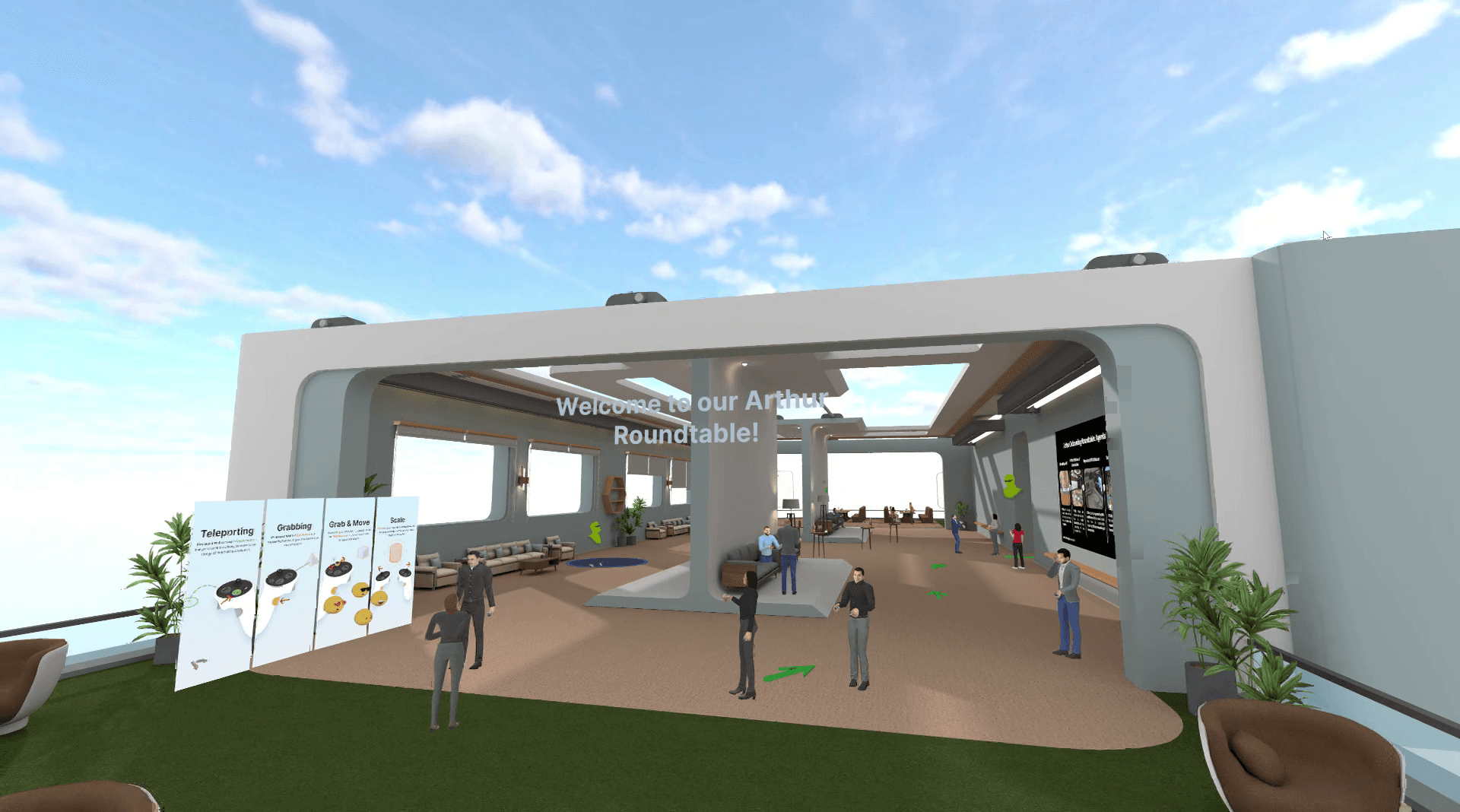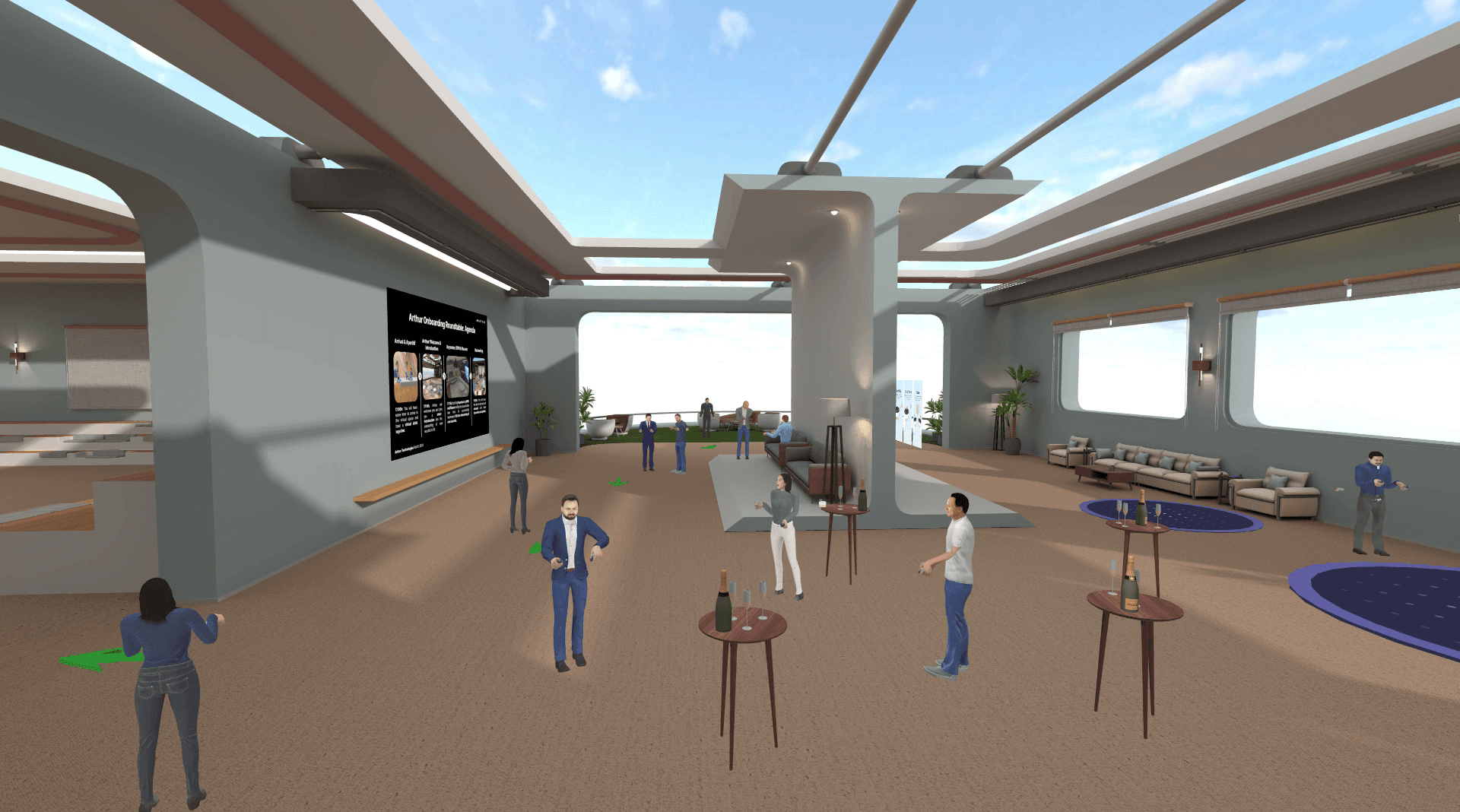Insights from the recent Arthur Roundtable on onboardings - featuring Mazars and BPM

In the recent Arthur Roundtable session held on 21st March 2024, enterprises came together to discuss and explore the future of new employee onboardings. This unique event showcased how BPM and Mazars, two leading clients of Arthur, are leveraging VR technology to enhance their onboarding processes, offering deep insights into the benefits and practicalities of innovative VR-based onboarding initiatives for new hires.
The roundtable began with a pre-event networking session, allowing participants to familiarize themselves with other participants, setting the stage for an interactive and engaging presentation. BPM was the first to share, detailing their journey with VR onboardings. They highlighted how VR has enabled them to transcend geographical barriers, creating an immersive experience that not only introduces new hires to the company culture and values but also fosters deep connections from the start. Erica from BPM highlighted, "VR has allowed us to break down barriers, logistical or physical, onboarding people across the globe, from India to the United States, fostering deeper connections with our company culture and values."
 Following BPM, Mazars took the stage to share their experience, emphasizing the interactive nature of their VR onboarding process. Through a custom VR space developed in collaboration with Arthur, Mazars has created an engaging roadmap for newcomers, complete with interactive stations that cover everything from company values to service lines. This approach not only educates new employees about the company but does so in a way that is memorable and engaging. Yulia from Mazars remarked, "Using VR during the onboarding period is not just memorable; it's a more interactive way for newcomers to learn by themselves, paying more attention to details and truly feeling the culture of Mazars."
Following BPM, Mazars took the stage to share their experience, emphasizing the interactive nature of their VR onboarding process. Through a custom VR space developed in collaboration with Arthur, Mazars has created an engaging roadmap for newcomers, complete with interactive stations that cover everything from company values to service lines. This approach not only educates new employees about the company but does so in a way that is memorable and engaging. Yulia from Mazars remarked, "Using VR during the onboarding period is not just memorable; it's a more interactive way for newcomers to learn by themselves, paying more attention to details and truly feeling the culture of Mazars."
 The event also provided a platform for a lively Q&A session, where attendees could delve deeper into the specifics of implementing VR onboarding processes. Questions ranged from logistical concerns, such as the distribution and return of VR headsets, to technical aspects like the ability to create audio zones for different stations within the virtual space to enable multiple people to learn simultaneously at different stations without disturbing others.
Even after the formal presentations concluded, many participants chose to stay back, continuing their discussions in private audio zones spawned within Arthur. This underscored the platform's capability to not only host large-scale events but also to facilitate intimate, productive conversations, mirroring the best aspects of in-person interactions in a virtual environment.
The event also provided a platform for a lively Q&A session, where attendees could delve deeper into the specifics of implementing VR onboarding processes. Questions ranged from logistical concerns, such as the distribution and return of VR headsets, to technical aspects like the ability to create audio zones for different stations within the virtual space to enable multiple people to learn simultaneously at different stations without disturbing others.
Even after the formal presentations concluded, many participants chose to stay back, continuing their discussions in private audio zones spawned within Arthur. This underscored the platform's capability to not only host large-scale events but also to facilitate intimate, productive conversations, mirroring the best aspects of in-person interactions in a virtual environment.
 Reflecting on the success of the event, it's clear that VR technology offers a transformative approach to onboarding new employees while allowing enterprises to create their own unique way of implementing and utilizing the technology. By creating immersive, interactive experiences, companies can not only convey their culture and values more effectively but also build strong connections among team members, regardless of their physical location. As one participant noted, "The ability to meet and interact with colleagues in a virtual space, as if face-to-face, is an incredible advancement, making the onboarding process not just informative but genuinely engaging."
As we look to the future, this edition of Arthur Roundtable has offered new insights for many participants to support their own implementation of VR for employee onboardings. This implementation is an opportunity that not only addresses the challenges of remote and hybrid working models but also opens up new avenues for creating more inclusive, engaging, and effective onboarding experiences. The insights shared by BPM and Mazars offer valuable lessons for any organization looking to follow their lead and leverage VR technology to enhance their onboarding processes and, ultimately, strengthen their organizational culture in an increasingly digital world.
Reflecting on the success of the event, it's clear that VR technology offers a transformative approach to onboarding new employees while allowing enterprises to create their own unique way of implementing and utilizing the technology. By creating immersive, interactive experiences, companies can not only convey their culture and values more effectively but also build strong connections among team members, regardless of their physical location. As one participant noted, "The ability to meet and interact with colleagues in a virtual space, as if face-to-face, is an incredible advancement, making the onboarding process not just informative but genuinely engaging."
As we look to the future, this edition of Arthur Roundtable has offered new insights for many participants to support their own implementation of VR for employee onboardings. This implementation is an opportunity that not only addresses the challenges of remote and hybrid working models but also opens up new avenues for creating more inclusive, engaging, and effective onboarding experiences. The insights shared by BPM and Mazars offer valuable lessons for any organization looking to follow their lead and leverage VR technology to enhance their onboarding processes and, ultimately, strengthen their organizational culture in an increasingly digital world.

Key Takeaways from the Onboarding Roundtable
1. Immersive Engagement : Both BPM and Mazars demonstrated that VR technology provides an unparalleled level of immersion, making onboarding sessions more engaging and memorable than traditional methods. This immersive engagement helps new hires connect with the company culture and values on a deeper level. 2. Breaking Down Barriers : The use of VR in onboarding processes allows companies to overcome geographical and logistical barriers. It enables new employees from across the globe to experience a sense of belonging and connection to their new workplace, regardless of their physical location. 3. Interactive Learning : The roundtable highlighted the potential of VR to transform passive learning into an interactive experience. By navigating through virtual spaces, employees can actively engage with content, leading to better retention and understanding of the company’s ethos and practices. 4. Fostering Connections : The ability to create private audio zones and engage in virtual networking sessions within the VR platform facilitates the building of relationships among new and old team members alike. This feature is particularly beneficial in remote and hybrid work settings, where creating personal connections can be challenging. 5. Flexibility and Customization : The discussions revealed how VR platforms like Arthur offer flexibility in onboarding program design. Companies can tailor their VR spaces with specific activities, presentations, and interactive elements that best represent their culture and meet their onboarding objectives. 6. Practical Considerations : Addressing logistical challenges such as the distribution and management of VR headsets is crucial for the successful implementation of VR onboarding. Companies shared their strategies for headset distribution and return, emphasizing the importance of planning and coordination. 7. Continuous Innovation : The roundtable underscored the evolving nature of VR technology and its applications in the workplace. As the technology advances, it will offer even more opportunities for innovative onboarding experiences, with lighter, more user-friendly equipment and enhanced interactive capabilities. 8. Broader Implications : The experiences of BPM and Mazars with VR onboarding suggest broader implications for employee training and development. VR technology can be applied beyond onboarding to continuous learning, team building, and leadership training, offering a comprehensive platform for employee engagement and development. In conclusion, the roundtable on VR onboarding hosted by Arthur provided valuable insights into the practical application and benefits of VR technology in welcoming new employees. As companies continue to explore and invest in VR, it is likely to become an increasingly integral part of creating effective, engaging, and inclusive onboarding experiences that resonate with employees in the digital age.